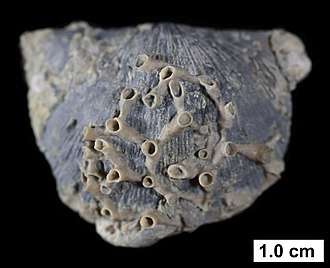Epibiont
An epibiont (from the Ancient Greek meaning "living on top of") is an organism that lives on the surface of another living organism.[1] An epibiont is, by definition, harmless to its host. In this sense, the interaction between the two organisms can be considered neutralistic or commensalistic; as opposed to being, for example, parasitic, in which case one organism benefits at the expense of the other, or mutualistic, in which both organisms obtain some explicit benefit from their coexistence). Examples of common epibionts are barnacles, remoras, and algae, many of which live on the surfaces of larger marine organisms such as whales, sharks, sea turtles, and mangrove trees. The host of the epibiont is typically referred to as the basibiont ("living underneath").[2]


Although there is no direct effect of the epibiont to the host, there are often indirect effects resulting from this interaction and change in the surface of the host. This has been found to be especially important to marine organisms and aquatic ecosystems, as surface qualities do impact necessary ecological functions such as drag, radiation absorption, nutrient uptake, etc.[3]
Types
- Epiphytes are plants that grow on the surface of other plants.
- Epizoic organisms are those that live non-parasitically on the surface of animals, according to Lexico.com.[4] Examples of epizoic species include mosses, algae, and fungi growing on Gymnopholus weevils, and bryozoans (moss animals) growing on other animals. However, in contrast, Dictionary.com says "epizoic," is parasitic, and defines " it, as "externally parasitic." [5]
See also
- Epiliths, organisms that grow on rocks
- Zoochory, seed dispersal by animals
- Epiphyte, an organism growing on a plant
- Endosymbiont
- Epiphytic bacteria
- Epiphytic fungus
References
- Lescinsky, H. L. (2001). "Epibionts". In Derek Briggs and Peter Crowther (ed.). Palaeobiology II. Wiley-Blackwell. pp. 460–63. doi:10.1002/9780470999295.ch112. ISBN 978-0-632-05149-6.
- Gregorio Fernandez-Leborans; Yukio Hanamura; Ryon Siow; Phaik-Ean Chee (2009). "Intersite epibiosis characterization on dominant mangrove crustacean species from Malaysia". Contributions to Zoology. 78 (1): 9–23.
- Martin Wahl (2008). "Ecological lever and interface ecology: epibiosis modulates the interactions between host and environment". The Journal of Bioadhesion and Biofilm Research. 24 (6): 427–38. doi:10.1080/08927010802339772. PMID 18686057.
- "Epizoic | Definition of Epizoic by Lexico". Lexico Dictionaries | English.
- "Epizoic | Definition of Epizoic by Dictionary.com". Dictionary.com | English.